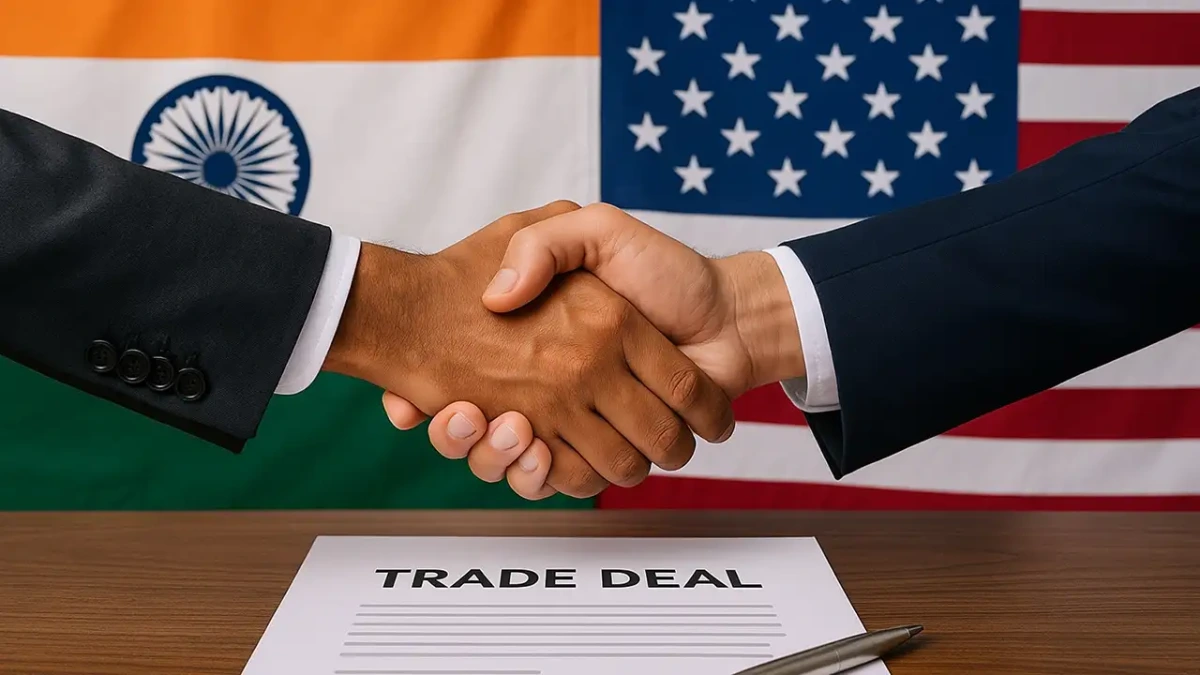
India has been strongly cautioned by trade experts not to hurry into a trade deal with the US that would endanger delicate industries like agriculture. Their worries coincide with Washington’s increasingly assertive trade policies, which have threatened to impose high tariffs on even its closest friends, such as the European Union (EU).
US’s Aggressive Trade Posture Raises Alarms

The warning comes after the US government recently proposed high penalties on major trading partners in letters. Notably, the EU and Mexico have been threatened with 30% tariffs beginning August 1, while Brazil might face up to 50% tariffs. These events highlight the US’s increasingly assertive posture, as it is now negotiating with more than 20 nations and putting pressure on more than 90 others to make trade concessions.
India is not the only country facing trade pressure from the United States, according to Ajay Srivastava, founder of the economic think tank Global Trade Research Initiative (GTRI). Mutually Agreed Settlements Achieved via Leveraged Arm-twisting, or “MASALA,” is a politically motivated, transactional requirement that provides nothing in the way of long-term trade assurance, according to Srivastava.
“India should not expect to receive a balanced or favourable deal if the US can threaten nations as big and powerful as the EU and Mexico,” Srivastava stated. He warned that deals struck under pressure could do irreparable harm and underlined the need for India to refrain from making rash concessions on key areas, particularly agriculture. In reference to the erratic character of US trade policy under the Trump administration, he continued, “Such deals may not even survive the next political shift in the US.”
Trump Announces 35% Tariff on Canadian Imports, Expands Trade War with New Global Tariffs
Global Pushback Against US Trade Demands

Other trade experts agree with Srivastava that India should exercise prudence in its current negotiations with the United States. As only a few nations, most notably the UK and Vietnam, have agreed to the US’s requirements despite months of diplomatic pressure, they note that the legitimacy of US President Donald Trump’s trade threats is eroding.
The EU, Australia, South Korea, Japan, and other major economies have all shown strong opposition, according to the Global Trade Research Initiative. These countries are resisting US requests, which frequently include tariff cuts without corresponding sacrifices. Further, US plans call for guaranteed purchases of U.S. goods while maintaining the ability to levy tariffs in the future, even after agreements are signed.
Trade experts and partner nations question the fairness and durability of any deal since such conditions show a unilateral strategy that puts US economic interests first.
Trump’s BRICS Tariff Threat Casts Shadow Over India-US Trade Deal
India’s Next Steps: Negotiations Ahead

A group of Indian trade negotiators is scheduled to visit Washington shortly to resume discussions on the planned Bilateral Trade Agreement (BTA) between the US and India in the midst of rising trade tensions throughout the world. Experts advise Indian politicians to maintain their resolve and withstand pressure techniques, given the vulnerability of industries like agriculture.
A sizable and politically significant agriculture sector is part of India’s economic landscape. Millions of farmers and the nation’s food security may be impacted by concessions in this region. As a result, experts emphasise how crucial it is to reach a deal that protects these interests and guarantees long-term advantages over immediate ones.
Trump Quietly Expands Trade War Strategy Across Asia to Undermine China
The Risks of a Hasty Agreement

Global trading partners now face uncertainty as a result of the Trump administration’s erratic trade policies. Changes in US political leadership or strategy could lead to the reverse or revision of agreements reached in a hurry or under duress. For nations like India thinking about legally binding trade agreements, this volatility adds another level of risk.
According to experts, India needs to carefully consider these risks and take a patient, strategic approach. It is advised that negotiators look for a fair, reciprocal agreement that takes into account India’s economic interests.
Markets Track Trump’s Trade Actions as the Tariff Deadline Draws Near
Conclusion
India’s trade relations with the United States are at a turning point. Given the current state of international trade, which is characterised by assertive US strategies and strong opposition from other nations, careful and deliberate negotiation is required.
Trade experts caution that giving in to pressure and hastening into deals that jeopardise delicate industries like agriculture may have long-term detrimental effects. India must put safeguarding its domestic interests first and work towards a stable, equitable, and long-term trading relationship with the US as significant negotiations approach.
The next several weeks will be crucial as Indian negotiators meet with Washington, weighing the necessity to protect the nation’s economic sovereignty and long-term well-being against the possible benefits of increased commerce.
